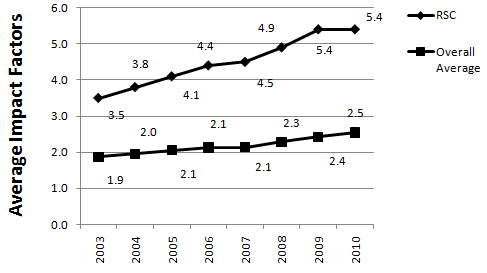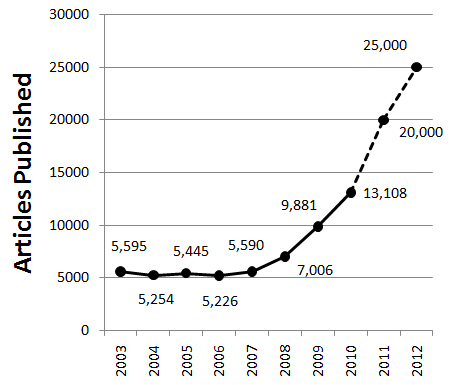We’re well-known at RSC Publishing for delivering high impact content for chemical scientists.
What’s not quite so well known is the significant growth in high quality content we’ve achieved – over 150% growth in the last three years. Working with our customers and authors, we have embarked on a significant project to increase the volume of quality international content we publish. This growth has been supported by well thought out price increases reflective of customer feedback, increases in costs related to the growth in quality content, and changes in the global economy.
The RSC Publishing Price List 2012 demonstrates this commitment. Please be sure to review the changes in this blog, especially regarding new subscription titles and package changes.
And because we’re part of a learned society and a not-for-profit publisher, you have the reassurance that any surplus we make from our publishing is reinvested back into the scientific community across the globe – funding key projects like ChemSpider, our free chemical structure database.
RSC Publishing Highlights 2011
We have been working hard towards delivering high quality global content in our resources, including a wider reach to the international community. Some highlights resulting from our efforts include:
 |
Growth in RSC Published Articles
|
 |
RSC 2010 ISI Impact Factor Success
|
RSC Publishing Package Changes
We’ve taken time to review our current packages and have revised them for a more simplified approach and collaborative offering. Now known as Collections, the changes are detailed below:
| Package | New Name | Resources Added | Details |
| RSC Gold | RSC Gold | Chemical Science, Food & Function, MedChemComm and Polymer Chemistry | |
| A+ | Package A+ | Chemical Science | No longer available for new subscribers however can be renewed by existing customers |
| A | Package A | Chemical Science | |
| K | Package K | ||
| B | Core Chemistry Collection | Chemical Science | |
| E | General Chemistry Collection | Chemical Science and Chemistry World | |
| F | Annual Reports Collection | ||
| G, H, I, J and L | Discontinued, existing customers will be able to migrate to the new Analytical Science Collection | ||
| Analytical Science Collection | Contains Analyst, Analytical Abstracts, Analytical Methods, Journal of Analytical Atomic Spectrometry and Journal of Environmental Monitoring |
RSC Publishing Price List 2012
New subscription titles for 2012 include:
|
|
|
|
The RSC Publishing Price List 2012 is also available to download if you prefer an electronic copy
GO TO www.rsc.org/pricing
Pricing Questions?
For more information on reviewing usage and subscribing to new content, upgrading to RSC Gold or discussing your current subscriptions, please contact your RSC Account Manager or your local subscription agent and we will happily help.
EMAIL sales@rsc.org
quoting marketing reference code P11009a












